|
 Power Generation ¢@ Nuclear Power Plant
Power Generation ¢@ Nuclear Power Plant

 Introduction
Introduction
Although nuclear power
generation is currently the secondary power generation
method in Taiwan, the power generation is much lower than
thermal power generation. In 2017, the power generation
structure of Taiwan Power Company accounted for 9.3% of
nuclear power generation and 82.6% of thermal power
generation. There are four nuclear power plants in Taiwan,
namely, the First Nuclear Power Plant (Shimen District, New
Taipei City), the Second Nuclear Power Plant (Wanli
District, New Taipei City), the Third Nuclear Power Plant (Hengchun
Town, Pingtung County), and the Fourth Nuclear Power Plant (Gongxi
District, New Taipei City). After Nuclear Plant 1, Nuclear
Plant 2, and Nuclear Power Plant 3 were finished
constructing, they joined the ranks of power generation. In
the past, the nuclear power was the most important power
generation mode in the power generation record of Taipower
Company. It reached the highest in 1985, accounting for
52.4%. In the same year, the thermal power generation just
accounted for 34.5%.
|
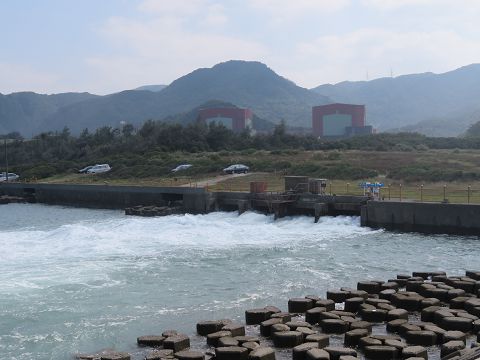 |
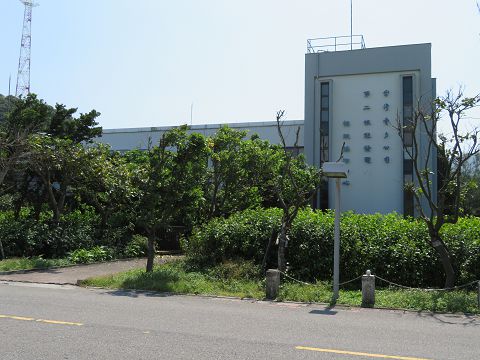 |
|
Nuclear Power Plant 2 and water outlet |
Analog Control Room of Nuclear Power Plant 2 |
 Theory
Theory
Nuclear power generation uses the
energy generated by the uranium splitting reaction to
operate. The control rod is used to control the speed of
splitting. The chain reaction produces huge heat energy to
make water into steam, and then drive the steam turbine and
generator to generate electricity. Now there are two types
of nuclear power generation: pressurized water and boiling
water, nuclear plant 1 and nuclear plant 2 are ¡§boiling
water nuclear power plants¡¨, and nuclear plant 3 is a
¡§pressurized nuclear power plant.¡¨ The two principles are
the same, but the ¡§pressurized nuclear power plant¡¨ system
is more complicated.

Hand drawing
 Current Situation
Current Situation
¡·Pros:
1.Low operation cost.
2.Suitable for power generation as a base load.
3.High safety stock.
4.No carbon and air pollutants during gernerating.
¡·Cons:
1.The construction cost which is 112,584 yuan / kw is high.
2.The construction period (about 13 years) is long .
3.Nuclear waste must be disposed well and the place is hard
to find.
4.The public has doubts about the safety of nuclear power.
 Taipower Exhibit Center in Northern Taiwan
Taipower Exhibit Center in Northern Taiwan
On November 27, 2018, we
visited Taipower Exhibit Center in Northern Taiwan is next
to the Second Nuclear Power Plant. The guide, Ms.Deng,
introduced the rotor parts of nuclear power plant. When we
visited the museum, she explained the operation mode of the
nuclear power plant and the brief history of the development
of Taiwan's electric power industry. Finally, she also
received an exclusive interview for us.
The outdoor display is that the gas turbine rotor was
eliminated from the nuclear power plant and weighed 139
metric tons, which is about the weight of two or three
thousand people. When the unit is in operation, the steam
will push the blades. The speed is very fast. It can be
rotated 1800 times in one minute. There is a total of three
gas turbine rotors in the nuclear power plant including two
low-pressure gas turbine rotors and one high-pressure gas
turbine rotor, and one more low-pressure gas turbine rotor
which is in outdoor display.
|
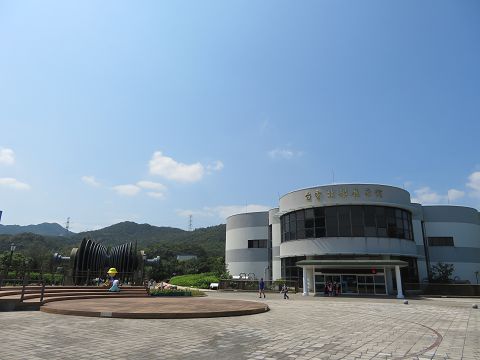 |
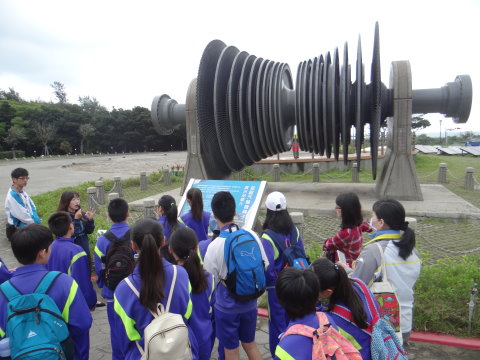 |
|
Taipower Exhibit Center in Northern Taiwan |
Old
turbine rotor of Nuclear Power Plant 2 |
There is a miniature model of the nuclear
reactor in the center, which is 8 times smaller than the
scale (1/2 of the scale), and 7 stories high for the real
entity. The second nuclear plant uses a water boiler. The
principle is like boiling water. When the water is boiled,
the steam will rush up and force to push the reactor. In the
middle of the nuclear reactor is a core with a fuel bundle
(nuclear fuel). There are 624 fuel bundles in the reactor.
The fuel rod in the fuel bundle can be used for 4 and a half
to 6 years.
There are more than one hundred and forty cross-type control
rods in the reactor. The control rod can control the rate of
nuclear splitting rise or fall. The rate of nuclear
splitting will affect the temperature and amount of steam.
Finally, it will affect the amount of power generated, so
the control rod can control power generation. In addition,
if cold water is pumped in, the temperature will decrease to
lead the amount of electricity low.
|
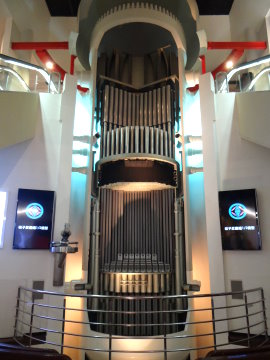 |
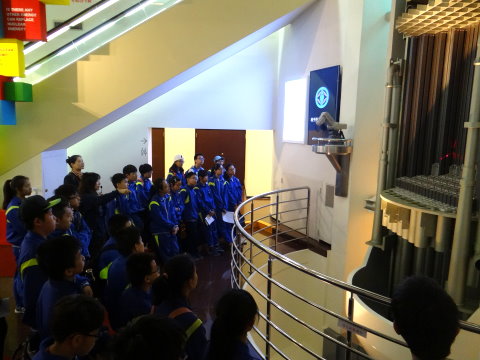 |
|
The miniature model of the nuclear reactor |
Explaing the reaction of the nuclear reactor |
The automatic detection device can sense
an earthquake. If an earthquake occurs, the control rod will
automatically rise up slow the speed of nuclear splitting.
When the earthquake reaches a certain level, the control rod
will automatically rise up, and then the reactor will stop
in as long as 3 seconds.
|
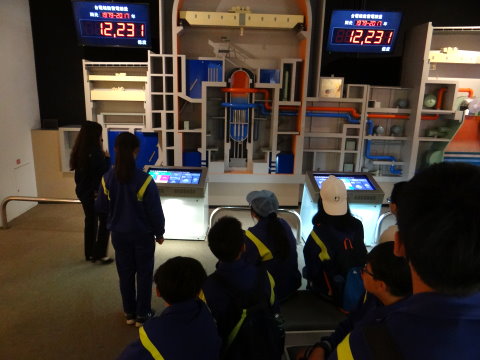 |
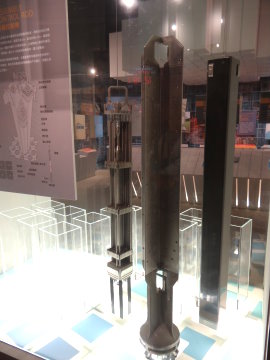 |
|
Explaing how nuclear power plant work |
Control rods can effect the rate of nuclear splitting |
The water in the reactor core is heated
and boiled, and the vapor rises up to the gas-water
separator, separating the vapor from the water. And next,
the vapor continues to rise, and then the water passes
through the gas-water separator and returns to the core. The
vapor rises to the steam dryer, and the water is filtered.
Finally, the dried steam pushes the turbine rotor and then
drives the generator to generate electricity. The fuel in
the reactor core will exceed 1000 degrees Celsius and the
steam will be 264 degrees, so the reactor needs water to
adjust the temperature.
 Nuclear Power Plant 1
Nuclear Power Plant 1
We went to the simulation control center of Nuclear Power
Plant 1 directly after visiting the North Exhibition Hall
because Nuclear Power Plant 2 which is next to the North
Exhibition Hall was undergoing overhaul and personnel
training. We first met up with Lin,Na-Hung , the planning
manager, on the first floor, and he gave us a short
presentation. Doing the interview of the simulation center
director, Huang,Ying-Chun. Eventually, we visited the analog
control room at second floor.
|
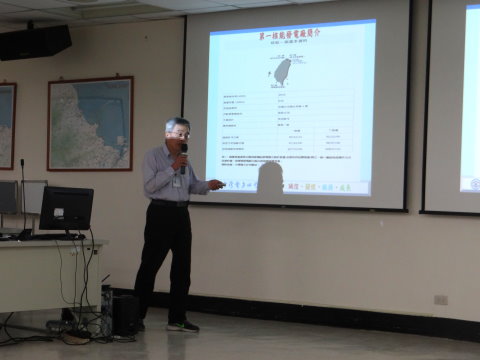 |
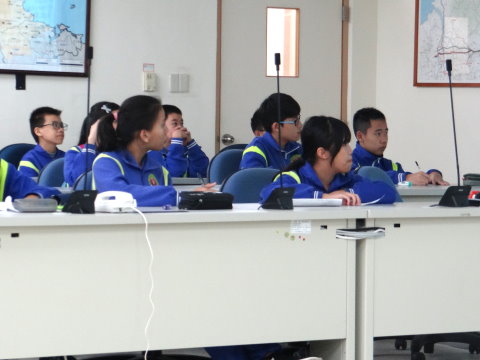 |
|
Listen to briefing of Nuclear Power Plant 1 |
Everyone listened to the briefing carefully |
¡·Introduction
The first nuclear power plant
began construction in 1971, and began to operate in 1978.
The first operation license was in December, 2018 and is
currently entering the decommissioning stage. The average
electricity price of Taipower is 2.8 NTD per kilowatt, and
the cost of nuclear power generation is 1.25 NTD, so the
cost of nuclear power is relatively low.

The power generation of the Nuclear Power Plant 1 in recent
years (provided by Taipower)
In the past few years, from 2007 to 2017,
the nuclear plant has continued power generation. Before the
annual power generation, the two machines can send 10
billion kWh of electricity. The figure shows that there is a
significant change in power generation in 2015 and 2017.
During the overhaul in 2015, the fuel handle of the machine
no.1 fell off, so it was stopped generating electricity at
that time. Because of the huge flood in June 2, 2017, the
power line of the machine no.2 went wrong. As the result, it
also stopped operating. The cycle of the machine no.2 is
almost over, so now neither machine is generating
electricity. The machine no.1 was decommissioned on December
6, 2018, and the machine no.2 was decommissioned on July 15,
2019 according to the plan of Taipower.
According to Enforcement Rules for the Implementation of
Nuclear Reactor Facilities Regulation Act, the nuclear power
plant will apply for three years before the decommissioning.
Therefore, the First Nuclear Power Plant has filed a
decommissioning application in November 2015. Now, there are
four stages of the decommissioning process in 25 years. The
first stage is the 8-year downtime transition, the second
stage is the 12-year decommission, the third stage is the
3-year final state detection, and the fourth stage is the
2-year site recovery.
The current difficulty, the First Nuclear Power Plant has to
face, is that the used fuel cannot be removed by the planned
schedule. The spent fuel pool is full. Entering the
decommissioning stage, but there is no way to empty the
reactor. Thus, there is no way to enter the
post-decommissioning process. In contrast, they can empty
fuel in the reactor in just six months abroad. Although the
nuclear power plant already has dry storage of spent fuel,
New Taipei City government did not approve the use of dry
storage because of the water conservation problem.
Therefore, the decommissioning process stopped.

The reactor cannot be emptied now (provided by Taipower)
The dry storage equipment is basically a
tub filled with burnt fuel. One tub can have 56 fuel
bundles, and then they are shielded with cement and placed
on a flat ground. The dry storage equipment will be
monitored and protected seriously, and the temperature and
radiation conditions will be monitored at any time. The data
will be connected to the control room, Nuclear Safety Duty
Center, and even the website of the headquarter, ¡§Nuclear
Power Insight.¡¨ At present, the First Nuclear Power Plant
has to wait for New Taipei City Government¡¦s permission to
empty the spent fuel pool and enter the late stage of
decommissioning officially.
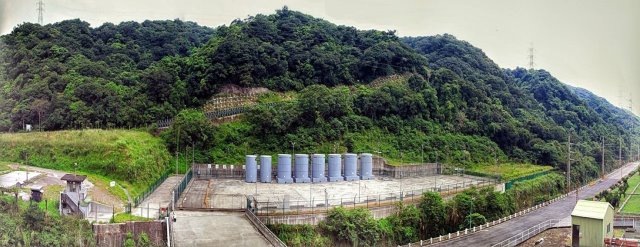
The dry storage of spent fuel (provided by Taipower)
¡·Analog Control Room
In order to provide a simulator
training place, the First Power Plant built the simulation
center. The simulator in the simulation center has been
updated to the third generation. The third generation is
unique because it can be connected via the Internet after
the 2013 update. The simulator has a set of computers, and
two instructor consoles to control the hard disk drive and
floppy disk for personnel training. The people who must have
a license to operate the unit, so those who want to take the
license must train here first. Besides, the people with
licenses must return to train every year, even the technical
manager or the headmaster need to be trained here, too.
|
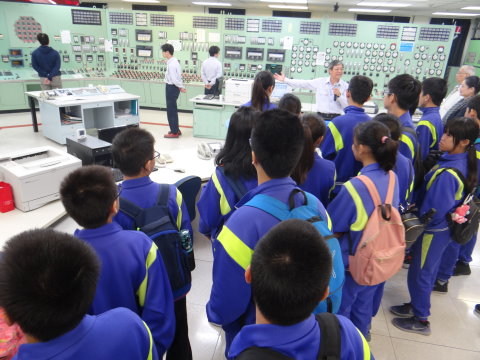 |
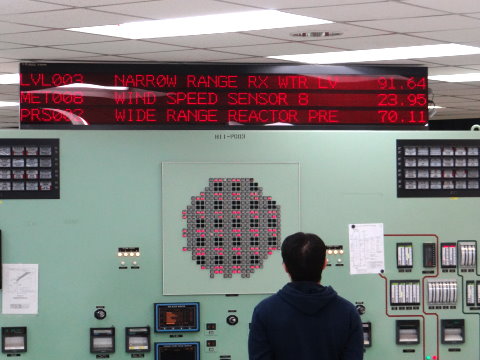 |
|
Analog Control Room |
The simulator shows the situation of the nuclear reactor |
When we visited the analog control room,
we saw a team of control room. Tsung-Cheng Wu, the duty
manager, stood behind and was responsible for the operation
and control of the entire unit, as well as the command.
There are two people who stood in front of Mr. Wu. One is a
reactor operator who is responsible for the operation of the
knob and the reactor core, another one is a reactor
assisting operator who is responsible for the keyboard and
some auxiliary equipment. We watched the power outage after
the simulated typhoon and the emergency response of the
earthquake.
|
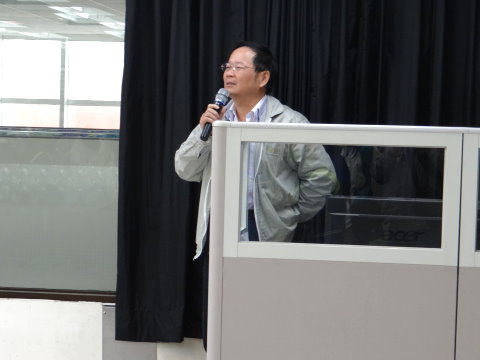 |
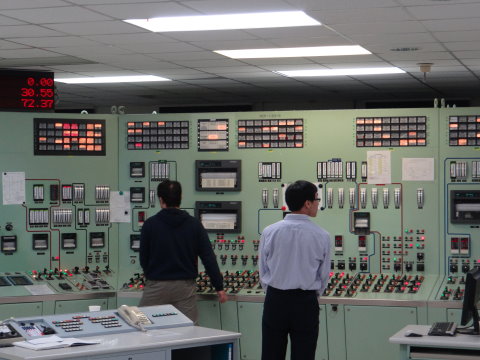 |
|
Mr. Wu directed the simulation |
The operator adjusted the control panel |
Suddenly, the control room lighted down
and an alarm sounded, and the duty manager commanded the
operators to control the complex panels. When the power
failure loses external power, the emergency diesel generator
will be turned on, and the power can be automatically
started within ten seconds. After the Fukushima incident
happened, the control room would also simulate the response
to the emergency diesel generators after the earthquake. We
understood that the normal operation of a power plant
requires a lot of professional participation. It is also not
easy to simulate many emergency situations after their
drill.
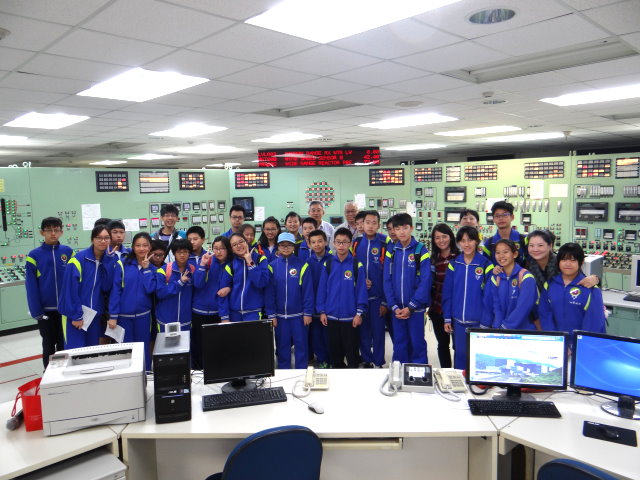
Group photo at the end
¡·Q and A
Ying-Chun Huang, director of
the Analog Control Center, answered the questions as
follows:
|
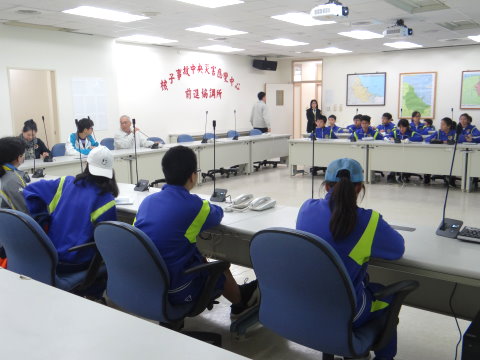 |
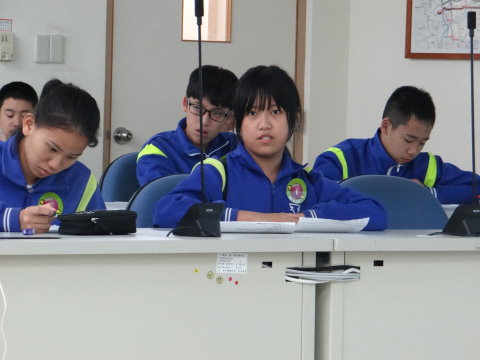 |
|
Q and
A discussion |
Asking
questions |
Q1¡GThe reactor will be cooled by seawater, but the
hot water it produces will be discharged into the sea at the
same time. Will it affect the ocean?
A1¡GAll nuclear power plants in Taiwan are built by
the sea because seawater is used to cool the reactor. The
efficiency of a power plant is about one-third, that is,
one-third of the energy produced by the reactor is converted
into electrical energy, and the other two-thirds become
unusable heat. Thus, it does need a lot of cooling water
which is seawater usually. Cooling water enters the
generator, which cools the vapor after power generation into
water, but the temperature of seawater will increase by
about 10 degrees, and they are all out together. At the same
time, the temperature of the discharged seawater will be
monitored by the control room. There are regulations to
prevent power plants from affecting marine life. Moreover,
the discharge water of Nuclear Power Plant 1 is in line with
government regulations.
Q2¡GWhat is the difference between radioactive
materials used in nuclear power plants and atomic bombs and
nuclear-powered submarines?
A2¡GUranium is main raw material for both, but the
biggest difference is the extent of concentration. The
concentration of nuclear power plants is about 5%, while the
atomic bomb is 95%, just like the difference between beer
and sorghum. Low concentrations of uranium in nuclear power
plants cannot be split by itself, and its chain reaction
must be generated in the reactor to generate electricity.
However, the atomic bomb is a rapid compression of uranium
to cause a supercritical reaction, and its energy is
released in a short time. Nuclear power plants are under the
control of human beings, releasing the energy in the nucleus
for the benefit of mankind, but the atomic bomb is a weapon.
They are totally different in function, though they use the
same materials.
|
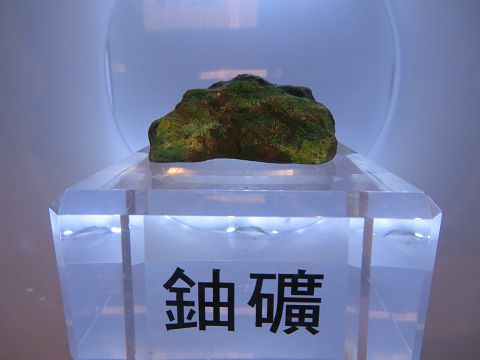 |
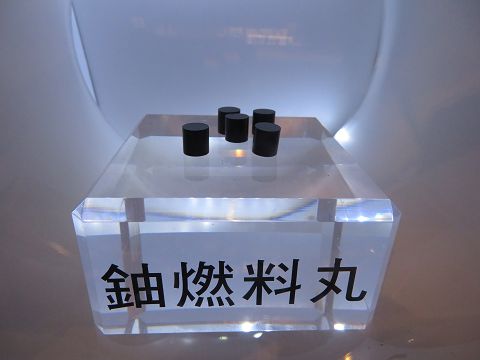 |
|
Uranium rock
(exhibition in Taipower Exhibit Center) |
Uranium pills used in nuclear power plants
(exhibition in Taipower Exhibit Center) |
Q3¡GHow to deal with the radioactive waste of nuclear
power plants?
A3¡GIt is radioactive. Radwaste can¡¦t be see or smell,
but it is measured by radiation monitor. In fact, the
current low-level radioactive waste monitors in Lanyu
measure less than in Taipei. Under the control of the
government, the value of the Lanyu waste yard monitor is
harmless to the human body. The disposal of radioactive
waste is best managed centrally in one place, otherwise it
will cause environmental pollution. Nuclear power plants and
related departments are dealing with radioactive waste,
which will consider geographical conditions such as 300,000
years of stable geology, and Taiwan has this kind of
location. However, Taipower nuclear project will face many
challenges due to policy changes and anti-nuclear groups.
The nuclear waste is placed in the factory, and people who
work here have not been affected, nor affecting the
surrounding residents. The government has a set of standards
to monitor our work situation.

We can check radiation report in Taipower website
 |